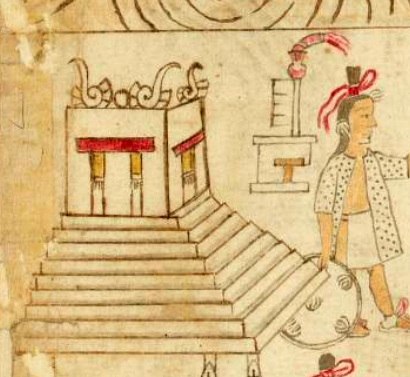tecciztli (Azca8)
This example of iconography is meant as a comparison for conch shells called the tecciztli. These were often cut in a cross-section view that would show the internal spirals or coils. Here, they decorate the roof of a building. As the contextualizing image shows, this building sits atop a large number of steps, like a temple might be.
Stephanie Wood
A sign next to a tecciztli at the Templo Mayor refers to the shell as a "turbinella angulata" and a large "gastropod shell...from the Atlantic coast of Mexico." It continues, "The presence of several specimens of the periostracum, a protein layer that covers the shell's surface, attests to the fact they were collected alive by divers, because this layer is lost when the animal dies in the sea and is dragged onto the beach by the swell of waves. A specimen of this species was found covered with blue pigment, perhaps to emphasize its relationship with water, in one of the offerings dedicated to Tlaloc. The conch also served for the production of a large number of objects including the ehecacozcatl, the pectoral characteristic of the god Ehecatl-Quetzalcoatl, which is produced by transversally cutting the shell's spiral whorls. Beads and pendants made of this shell have also been found." See other examples of the conch shell, cut and uncut, below.
Stephanie Wood
post-1550, possibly from the early seventeenth century
Jeff Haskett-Wood
shells, caracoles, conchas, tecciz
tecciz(tli), conch shell, https://nahuatl.wired-humanities.org/content/tecciztli
The Codex Azcatitlan is also known as the Histoire mexicaine, [Manuscrit] Mexicain 59–64. It is housed in the Bibliothèque Nationale de France, and hosted on line by the World Digital Library and the Library of Congress.
https://www.loc.gov/resource/gdcwdl.wdl_15280/?sp=8&st=image
The Library of Congress is “unaware of any copyright or other restrictions in the World Digital Library Collection.” But please cite Bibliothèque Nationale de France and this Visual Lexicon of Aztec Hieroglyphs.


